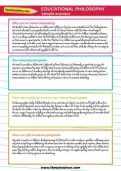Important update from TheSchoolRun
For the past 13 years, TheSchoolRun has been run by a small team of mums working from home, dedicated to providing quality educational resources to primary school parents. Unfortunately, rising supplier costs and falling revenue have made it impossible for us to continue operating, and we’ve had to make the difficult decision to close. The good news: We’ve arranged for another educational provider to take over many of our resources. These will be hosted on a new portal, where the content will be updated and expanded to support your child’s learning.
What this means for subscribers:
- Your subscription is still active, and for now, you can keep using the website as normal — just log in with your usual details to access all our articles and resources*.
- In a few months, all resources will move to the new portal. You’ll continue to have access there until your subscription ends. We’ll send you full details nearer the time.
- As a thank you for your support, we’ll also be sending you 16 primary school eBooks (worth £108.84) to download and keep.
A few changes to be aware of:
- The Learning Journey weekly email has ended, but your child’s plan will still be updated on your dashboard each Monday. Just log in to see the recommended worksheets.
- The 11+ weekly emails have now ended. We sent you all the remaining emails in the series at the end of March — please check your inbox (and spam folder) if you haven’t seen them. You can also follow the full programme here: 11+ Learning Journey.
If you have any questions, please contact us at [email protected]. Thank you for being part of our journey it’s been a privilege to support your family’s learning.
*If you need to reset your password, it will still work as usual. Please check your spam folder if the reset email doesn’t appear in your inbox.
Are you cut out to home educate?

Making the decision to home educate your child is a bold step, and it's natural to wonder whether you're the right person for the job. After all, teachers have been through years of training to qualify them for the job; can you really measure up as your child's only teacher?
It's natural to have cold feet about taking such a big step into the unknown, so to put your mind at rest, we asked the experts to address some of the most common worries about becoming a home educator.


Free home education planning pack & resources
- Guidance, templates & advice
- Practical tips from experts and parents
- How to establish a routine and set goals
"I’m not qualified to teach anything"
You might not have a teaching qualification, but in your own way, you’ve been educating your child since they were born. Think about it – all that reading, painting, craft, swimming, time at the park (and answering those countless questions) add up to a significant exchange of knowledge.
Edwina Theunissen of the charity Education Otherwise believes home education is more about learning than teaching. 'It’s really a question of following the child’s interests,' she says. More to the point, the law doesn't require you to have any qualifications, training or experience to home educate your child. If you're willing to do it, that's the only qualification you need.
"I was hopeless at maths at school. How will I be able to teach it at home?"
'Often, parents and children learn a subject together,' says Edwina. 'Some parents are amazed that the maths which seemed so mysterious in school becomes quite clear now they’re grown up!' Bear in mind that you won't be teaching your child GCSE-level subjects from day one; it's a gradual progression that will start off easy and gradually grow in difficulty as you and your child become more confident and skilled.
And don’t forget the huge range of resources you can use – from books at the library to online information from trusted sources, tutors, skilled friends and kits available from distance-learning companies.
"I’d have to give up my job"
Finances are worth thinking carefully about, especially if you're planning to home educate long-term, but take confidence from the fact that many people make it work. Home education doesn't have to happen between 9am and 3pm, so perhaps you and your child could work together after your working day has finished. Other options are working from home, both parents going part-time, flexi-schooling and making personal sacrifices such as holidays or home improvements.
" I’d go mad stuck at home all day"
'It isn’t necessary to stay at home for your children to be educated,' says Edwina. 'There are home education groups all around the country which meet for socialising and courses. Education can also take place in art galleries, museums, libraries, nature reserves and sports clubs.' In fact, home education can be a far more social experience than sending your child to school, with you and your child meeting not just families with children of the same age, but of all different ages and from other walks of life.
"My child won’t be properly socialised"
'People often worry that their children won't get to socialise with others, but home educators would generally argue that at school, children only relate to children of their own age, whereas home-educated children spend a lot of time with children and adults of all ages,' says Dr Alan Thomas, honorary senior lecturer at the Institute of Education, University College London. This could be through home education groups, organised classes like music or drama lessons, workshops put on by local museums and galleries, sports clubs... The list is endless.
It may be more difficult for your child to socialise if you live in a remote area, but even if there are no home education groups near you, there are bound to be other groups and classes for your child to get involved with, such as the Scouting and Guiding organisations, swimming lessons, choirs, orchestras and other similar clubs.
"We live in a small flat and haven’t got much space"
Essentially, all you need to home educate is a surface to work on. It doesn't even need to be a desk: the kitchen table will do. You can learn a great deal outside the home as well as within, so you don't need to be cooped up all day.
"My child wouldn’t do what I told them!"
You might be concerned about the dynamics of being a both parent and teacher. 'Negotiation and motivation are the keys here,' believes Edwina. 'When a child is interested in a subject, or if the subject is a means to an end, they can learn very fast indeed. Education at home is much more flexible than in school, as children can learn about what interests them and often they learn the basics – literacy and numeracy – through their topic of interest.'
So yes, your child might protest if you're asking them to sit down and tackle a maths worksheet, but if you can bring that to life by applying it to something they're keen on, such as football or cooking, you can keep their motivation up and help them stay engaged.
"I don’t know how to plan lessons"
Home educators often start with organising learning in a structured way, but as their confidence grows, learning becomes more flexible, believes Edwina. 'Much home education takes place through conversations with knowledgeable adults,' she says.
If you're worried about planning lessons, workbooks can be a good place to start, but try not to focus too much on your daily hour of maths or literacy: the core subjects will often naturally be covered as you delve into a topic that your child has chosen.
"Home-educating seems very expensive"
Learning resources don’t have to be costly and it is possible to home educate on a budget. Start off with the basics – a well-equipped pencil case with protractor, compass and ruler; a dictonary; a calculator and an atlas. A computer and television can be useful. You can bulk buy stationery or share with other home educators. Don’t buy too many resources at first – ask others what they find useful. Many home education groups have resources that members can borrow or swap.
Your local council might offer you access to school resources, a discount to the leisure centre or extra borrowing privileges at the library. TheSchoolRun also offers a home educators package.
Some charitable trusts offer funds to families with children of special educational needs, and if you're eligible, Child Benefit and Child Tax Credits should continue until 19 as long as your child is in full-time education (which includes home education). In Scotland, eligible children aged over 16 can claim Education Maintenance Allowance.
Is home education for everyone?
'Parents tend to think that education is a very specialised business and forget that they have been teaching their children from birth,' says Edwina. She acknowledges that finances can make it difficult and also that some parents need or wish to have time away from children, but she's encouraging about the bonds that can be developed by learning together.
“Children’s charm is often masked by having to cope with the stresses of school attendance, and many parents feel unable to cope with the fallout from this stress,' she explains. 'But once they're free of that stress, it’s amazing what good company children are.'
Remember that home education doesn't have to mean that you and your child are together 24/7: taking advantage of home education groups, workshops, classes and courses and tutors can help you strike a balance between teaching your child at home and having some much-needed time apart.








